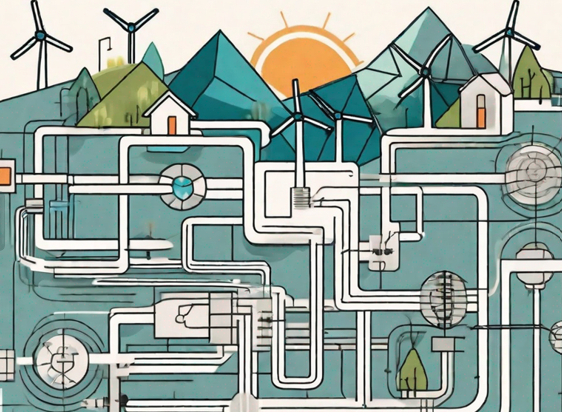
Renewable Energy Workforce Trends: Navigating Recruitment Challenges in a Growing Sector
13 Sep, 20235
Contents
- Understanding the Renewable Energy Sector
- The Rise of Renewable Energy
- Key Players in the Renewable Energy Sector
- Workforce Trends in Renewable Energy
- Current Workforce Landscape
- Future Workforce Predictions
- Recruitment Challenges in Renewable Energy
- Identifying the Skill Gap
- Overcoming Geographical Limitations
- Strategies for Effective Recruitment in Renewable Energy
- Building a Strong Employer Brand
- Leveraging Technology in Recruitment
- The Role of Government and Policy in Renewable Energy Recruitment
- Impact of Government Policies on Recruitment
- The Need for Policy Reforms
The renewable energy sector has been gaining significant momentum in recent years, as the world looks for sustainable alternatives to traditional energy sources. As this industry continues to grow, so does the need for a skilled and talented workforce to drive innovation and ensure the success of renewable energy projects. However, navigating the recruitment challenges in this constantly evolving sector can be a daunting task for employers. In this article, we will explore the key trends in the renewable energy workforce, the recruitment challenges faced by employers, and strategies to effectively navigate these challenges.
Understanding the Renewable Energy Sector
The Rise of Renewable Energy
Renewable energy sources such as solar, wind, hydro, and biomass have gained significant traction in recent years due to their lower environmental impact and long-term sustainability. The global push towards reducing greenhouse gas emissions and combating climate change has further accelerated the growth of the renewable energy sector.
Renewable energy is not just a passing trend, but a necessary shift towards a more sustainable future. Solar power, for example, harnesses the energy from the sun, which is an abundant and renewable resource. It is estimated that the amount of solar energy that hits the Earth's surface in just one hour is enough to meet the world's energy needs for an entire year. This incredible potential has led to the rapid development and adoption of solar power technologies.
Wind energy, on the other hand, utilizes the power of the wind to generate electricity. Wind turbines, often seen dotting the landscape, are capable of converting the kinetic energy of the wind into usable electrical energy. With advancements in turbine technology and the identification of suitable wind farm locations, wind energy has become a major player in the renewable energy sector.
Hydropower, another renewable energy source, harnesses the energy of flowing or falling water to generate electricity. This can be achieved through the use of dams or other structures that control the flow of water. Hydropower has been utilized for centuries, with ancient civilizations using water wheels to grind grain and power machinery. Today, hydropower accounts for a significant portion of the world's electricity generation.
Biomass, derived from organic matter such as plants and animal waste, is another renewable energy source that has gained attention in recent years. Biomass can be converted into various forms of energy, including heat, electricity, and biofuels. The use of biomass as an energy source not only reduces reliance on fossil fuels but also helps to manage waste and promote sustainable land use.
Key Players in the Renewable Energy Sector
In order to effectively navigate the recruitment challenges in the renewable energy sector, it is important to have a clear understanding of the key players involved. From renewable energy developers and project owners to equipment manufacturers and installers, there are various stakeholders that contribute to the success of renewable energy projects.
Renewable energy developers play a crucial role in identifying and developing suitable sites for renewable energy projects. They conduct feasibility studies, assess the potential environmental impact, and secure the necessary permits and approvals. These developers work closely with project owners, who may be individuals, corporations, or even communities, to ensure the successful implementation of renewable energy projects.
Equipment manufacturers, on the other hand, are responsible for designing and producing the various components required for renewable energy systems. Whether it's solar panels, wind turbines, or hydroelectric generators, these manufacturers play a vital role in ensuring the availability of reliable and efficient equipment for renewable energy projects.
Installation and maintenance are also key aspects of the renewable energy sector. Installers are responsible for setting up the renewable energy systems, ensuring that they are properly connected to the grid, and conducting necessary tests and inspections. Maintenance teams, on the other hand, are responsible for the ongoing upkeep and repair of renewable energy systems to ensure their optimal performance.
Furthermore, the renewable energy sector also relies on various support services such as financing, consulting, and research and development. Financing institutions provide the necessary capital for renewable energy projects, while consulting firms offer expertise in areas such as project management, regulatory compliance, and market analysis. Research and development institutions, on the other hand, drive innovation in the renewable energy sector by developing new technologies and improving existing ones.
Workforce Trends in Renewable Energy
Renewable energy has become a driving force in the global push for sustainable and clean energy sources. As the world acknowledges the urgent need to reduce greenhouse gas emissions and combat climate change, the renewable energy sector has emerged as a key player in the transition towards a greener future.
Current Workforce Landscape
With the increasing adoption of renewable energy technologies, the workforce landscape in this sector has been evolving rapidly. The renewable energy industry requires a diverse range of skills and expertise to design, develop, and operate these clean energy systems. Professionals with backgrounds in engineering, project management, environmental science, and technical expertise are in high demand.
Engineers play a crucial role in the renewable energy sector, as they are responsible for designing and optimizing various renewable energy systems. From solar photovoltaic (PV) panels to wind turbines and hydroelectric power plants, engineers are at the forefront of developing innovative solutions to harness the power of nature.
Project managers are essential in ensuring the successful implementation of renewable energy projects. They oversee the entire project lifecycle, from planning and procurement to construction and commissioning. Their expertise in coordinating different stakeholders and managing resources is vital for the timely and efficient completion of renewable energy projects.
Environmental scientists play a significant role in assessing the environmental impact of renewable energy projects. They conduct thorough studies to evaluate the potential effects on ecosystems, wildlife, and local communities. By identifying and mitigating any negative impacts, environmental scientists contribute to the sustainable development of the renewable energy sector.
Technical experts, such as electricians and technicians, are crucial for the installation, operation, and maintenance of renewable energy systems. They ensure that these systems are functioning optimally and troubleshoot any issues that may arise. Their expertise in electrical systems and renewable energy technologies is invaluable in keeping the clean energy infrastructure running smoothly.
Future Workforce Predictions
As the world continues to prioritize renewable energy, the future of the sector looks promising. Projections indicate that the renewable energy industry will experience substantial growth in the coming years, creating a strong demand for skilled workers.
Advancements in technology, such as more efficient solar panels and wind turbines, will drive the need for professionals with expertise in these emerging technologies. As renewable energy becomes more cost-effective and competitive with traditional energy sources, the demand for skilled workers will continue to rise.
Moreover, increased investment in renewable energy projects by governments, corporations, and individuals will further stimulate job creation in the sector. As more countries set ambitious renewable energy targets and implement supportive policies, the demand for professionals in renewable energy will soar.
The renewable energy workforce of the future will not only consist of engineers, project managers, environmental scientists, and technical experts but will also require professionals with expertise in energy storage, grid integration, and energy efficiency. As the renewable energy sector expands, new job roles and specializations will emerge, creating even more opportunities for individuals passionate about sustainability and clean energy.
In conclusion, the renewable energy sector is experiencing a significant shift in the workforce landscape. The demand for professionals with expertise in renewable energy technologies and project development is growing rapidly. With advancements in technology and increased investment in renewable energy projects, the sector is poised to generate numerous employment opportunities in the years to come.
Recruitment Challenges in Renewable Energy
Identifying the Skill Gap
One of the primary recruitment challenges in the renewable energy sector is identifying the skill gap. With the rapid growth of the sector, there is often a shortage of professionals with specialized knowledge in renewable energy technologies. This makes it crucial for employers to identify the specific skills required for their projects and develop targeted recruitment strategies.
Renewable energy technologies encompass a wide range of disciplines, including solar, wind, hydro, and geothermal power. Each of these areas requires a unique set of skills and expertise. For example, solar energy projects require professionals with knowledge in photovoltaic systems, while wind energy projects require expertise in turbine technology and maintenance. Identifying these specific skill requirements can be challenging, as the field is constantly evolving with new technological advancements.
To bridge the skill gap, employers can collaborate with educational institutions and training centers to develop specialized programs that equip individuals with the necessary skills. This can include offering internships, apprenticeships, and scholarships to attract and nurture talent in the renewable energy sector. By investing in the development of future professionals, employers can ensure a sustainable workforce for their projects.
Overcoming Geographical Limitations
Another challenge faced by renewable energy employers is the geographical limitations of certain project sites. Renewable energy projects are often located in remote areas or offshore, which can pose challenges in recruiting and retaining a skilled workforce.
Remote areas may lack the necessary infrastructure, such as housing and transportation facilities, which can deter potential candidates from considering job opportunities in these locations. To overcome this limitation, employers can offer attractive compensation packages that include benefits like housing allowances, transportation allowances, and relocation assistance. Providing adequate housing and transportation facilities near project sites can also incentivize professionals to work in remote areas.
Furthermore, employers can leverage technology to overcome geographical limitations. Remote monitoring and control systems allow for real-time monitoring and maintenance of renewable energy projects, reducing the need for on-site personnel. This opens up opportunities for professionals to work remotely or on a rotational basis, minimizing the impact of geographical constraints.
In conclusion, recruitment challenges in the renewable energy sector include identifying the skill gap and overcoming geographical limitations. By developing targeted recruitment strategies, collaborating with educational institutions, and offering attractive compensation packages, employers can attract and retain a skilled workforce. Additionally, leveraging technology can help overcome geographical constraints and create opportunities for remote work in the renewable energy industry.
Strategies for Effective Recruitment in Renewable Energy
Building a Strong Employer Brand
Developing a strong employer brand is essential for attracting and retaining top talent in the renewable energy sector. In a world where climate change is a pressing concern, individuals are increasingly drawn to organizations that prioritize sustainability and environmental responsibility. By highlighting the impact and importance of renewable energy projects, employers can showcase their commitment to creating a greener future. This not only attracts talented individuals who are passionate about renewable energy but also helps in building a positive reputation within the industry.
Furthermore, showcasing career development opportunities is another effective way to enhance an employer's brand value. The renewable energy sector is constantly evolving, with new technologies and innovations emerging regularly. By offering training programs, mentorship opportunities, and the chance to work on cutting-edge projects, employers can demonstrate their dedication to employee growth and professional development. This not only attracts ambitious individuals but also fosters a culture of continuous learning and improvement within the organization.
Additionally, promoting a positive work culture is crucial in attracting and retaining top talent. The renewable energy sector is known for its collaborative and mission-driven work environments. By emphasizing teamwork, open communication, and a shared sense of purpose, employers can create an atmosphere that is both fulfilling and inspiring. This not only attracts individuals who thrive in such environments but also helps in retaining employees in the long run, reducing turnover rates, and ensuring stability within the organization.
Leveraging Technology in Recruitment
Technology can play a crucial role in streamlining the recruitment process in the renewable energy sector. With the increasing demand for renewable energy professionals, traditional recruitment methods may not be sufficient to identify and hire the best-suited candidates for projects. This is where technology comes into play.
Online job portals have become a popular platform for both job seekers and employers in the renewable energy sector. These portals allow employers to reach a wider pool of candidates, including those who may not be actively searching for job opportunities. By utilizing these platforms, employers can cast a wider net and attract individuals with diverse skill sets and experiences, ensuring a more comprehensive talent pool to choose from.
Virtual interviews have also gained prominence in the recruitment process. With advancements in video conferencing technology, employers can conduct interviews with candidates from different locations, eliminating the need for travel and reducing logistical challenges. This not only saves time and resources but also allows for a more efficient evaluation of candidates, as multiple interviewers can participate regardless of their physical location.
Data analytics tools are another technological advancement that can greatly benefit the recruitment process. These tools can analyze large volumes of candidate data, such as resumes, cover letters, and online profiles, to identify patterns and trends. By leveraging data analytics, employers can quickly screen candidates based on specific criteria, such as relevant experience, qualifications, and skills. This not only speeds up the initial screening process but also ensures a more objective evaluation of candidates, minimizing bias and increasing the chances of finding the best fit for the role.
In conclusion, developing a strong employer brand and leveraging technology are two key strategies for effective recruitment in the renewable energy sector. By highlighting the impact of renewable energy projects, offering career development opportunities, promoting a positive work culture, and utilizing technology in the recruitment process, employers can attract and retain top talent, ultimately contributing to the growth and success of the renewable energy industry.
The Role of Government and Policy in Renewable Energy Recruitment
Impact of Government Policies on Recruitment
Government policies and incentives play a critical role in shaping the renewable energy sector and, consequently, the recruitment landscape. Favorable policies, such as tax incentives and grants, can attract more investment in renewable energy projects and create a conducive environment for employers to recruit and retain skilled workers.
The Need for Policy Reforms
While government support is crucial, there is also a need for policy reforms that address the specific challenges faced by renewable energy employers. This includes creating standardized certifications and training programs, establishing clear guidelines for project approval, and promoting collaboration between industry stakeholders and educational institutions.
The renewable energy sector is undoubtedly an exciting and promising field that offers numerous career opportunities. However, navigating the recruitment challenges in this growing sector requires a strategic approach, focusing on identifying talent gaps, building a strong employer brand, and leveraging technology. By adopting these strategies and working collaboratively with government and policy-makers, employers can successfully navigate the recruitment challenges in the renewable energy sector and ensure a skilled workforce for the future.
Whether you are a candidate looking for the latest jobs in the renewable energy sector or a company that requires this expertise, we are here to support you. By contacting us today, you can learn all about how our best-in-class recruitment services can help you achieve your goals.


